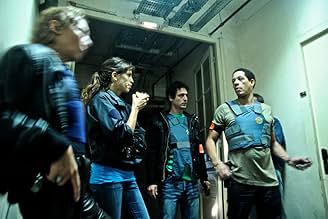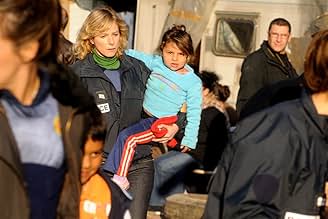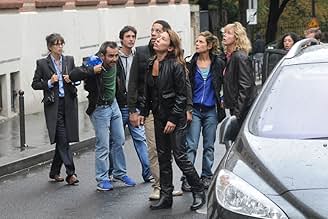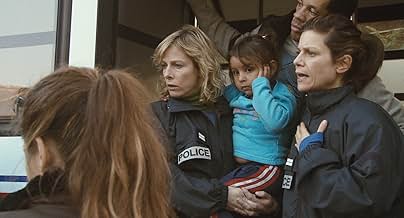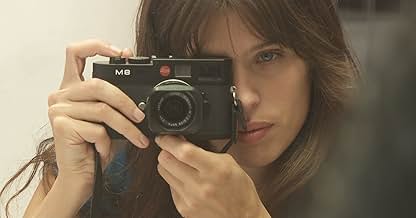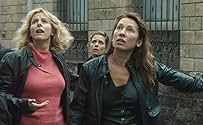Polisse
- 2011
- Tous publics
- 2h 7min
NOTE IMDb
7,3/10
16 k
MA NOTE
Une journaliste couvrant le travail des policiers de la brigade des mineurs entame une liaison avec un de ses sujets.Une journaliste couvrant le travail des policiers de la brigade des mineurs entame une liaison avec un de ses sujets.Une journaliste couvrant le travail des policiers de la brigade des mineurs entame une liaison avec un de ses sujets.
- Récompenses
- 7 victoires et 22 nominations au total
Frédéric Pierrot
- Baloo
- (as Frederic Pierrot)
Avis à la une
Polisse was my favourite film at the recent Sydney Film Festival. A french film from writer, director, star Maiween, it tells the story of the Child Protection Unit in Paris. It was absolutely riveting from start to finish.
An ensemble piece that moves at a cracking pace, it could be forgiven for not establishing character, but it actually manages to do that and do it very well. We are introduced to this group of close knit colleagues as they go about their day trying to balance the horrors they have to deal with (rapists, kidnappers, abusers, paedophiles) with their personal lives.
Maiween spent quite some time with a real CPU and told us in the Q&A that all the cases she featured are just like ones she witnessed and with that experience she brought an almost documentary feel at the same time as adding creative drama and plot to moments of the story as they rush through case after case. The performances are all excellent and the editing is sublime (it won a French Oscar for this).
It's shocking, emotional, intense and surprisingly very funny.
Highly recommended if you like hard-hitting films that deal with serious subjects in a very human and darkly humorous way.
An ensemble piece that moves at a cracking pace, it could be forgiven for not establishing character, but it actually manages to do that and do it very well. We are introduced to this group of close knit colleagues as they go about their day trying to balance the horrors they have to deal with (rapists, kidnappers, abusers, paedophiles) with their personal lives.
Maiween spent quite some time with a real CPU and told us in the Q&A that all the cases she featured are just like ones she witnessed and with that experience she brought an almost documentary feel at the same time as adding creative drama and plot to moments of the story as they rush through case after case. The performances are all excellent and the editing is sublime (it won a French Oscar for this).
It's shocking, emotional, intense and surprisingly very funny.
Highly recommended if you like hard-hitting films that deal with serious subjects in a very human and darkly humorous way.
The average time that someone can work in child protection is two years. Some last longer, or there would not be supervisors, but it is a rough business, as this film depicts.
What should grab you is that they move from case to case without any continuity. This is the real world of child protection. You deal with a druggie mother today, a pederast grandfather tomorrow, and neglected or abused children the next day.
Some may find the language off-putting, but that is the way it is. You are under such stress during work, that you have to relieve it somehow after you get off. It may be crude, but it is effective.
I can also relate to those who lose it occasionally. You can put your heart and soul into this job, and get frustrated easily by parents and the bureaucracy.
The film may have been actors, but it has a documentary feel as they portray the action as it really happens.
What should grab you is that they move from case to case without any continuity. This is the real world of child protection. You deal with a druggie mother today, a pederast grandfather tomorrow, and neglected or abused children the next day.
Some may find the language off-putting, but that is the way it is. You are under such stress during work, that you have to relieve it somehow after you get off. It may be crude, but it is effective.
I can also relate to those who lose it occasionally. You can put your heart and soul into this job, and get frustrated easily by parents and the bureaucracy.
The film may have been actors, but it has a documentary feel as they portray the action as it really happens.
What an excellent film!
Full of good dialogue that feels real and down to earth it was not surprising to hear Maiwenn say (at the Sydney Film Festival Q&A) she had spent time with the real CPU. The reality of the emotions and the truthfulness of the situations this team faced was evident and really made the difference to this film.
What stops the review getting full marks is the films tendency to let some of the less interesting scenes play for too long. Oddly it's also the love story she included to make the film seem less bleak and Maiwenn's own character that become unnecessary and make the movie overburdened and run a little too long.
The cast is absolutely fantastic and engaging. Their relationships heartfelt and natural; you would think they had been playing this together for years.
This is a movie of the tougher, grimy side of a city. It presents the human behaviours we shudder to believe exist. And yet, handled so superbly, you will not feel wrung out or overwhelmed. It's a terrific movie that will have you talking for a long time.
Full of good dialogue that feels real and down to earth it was not surprising to hear Maiwenn say (at the Sydney Film Festival Q&A) she had spent time with the real CPU. The reality of the emotions and the truthfulness of the situations this team faced was evident and really made the difference to this film.
What stops the review getting full marks is the films tendency to let some of the less interesting scenes play for too long. Oddly it's also the love story she included to make the film seem less bleak and Maiwenn's own character that become unnecessary and make the movie overburdened and run a little too long.
The cast is absolutely fantastic and engaging. Their relationships heartfelt and natural; you would think they had been playing this together for years.
This is a movie of the tougher, grimy side of a city. It presents the human behaviours we shudder to believe exist. And yet, handled so superbly, you will not feel wrung out or overwhelmed. It's a terrific movie that will have you talking for a long time.
Polisse is a difficult film to define. Based on real-life cases dealt with by the Child Protection Unit covering the 19th arrondissement (borough or quarter) of Paris, it could possibly be called a docudrama, although it does not cover events of historical significance.
Maïwenn, who wrote, directed and featured in the film as a photojournalist shadowing the unit, spent time herself with such a unit for research. All the cases featured in the film are supposed to have taken place while she was there or were recounted to her at that time. It is this that gives the film its lifelike, gritty quality. Indeed, the first scene plunges straight into an interview with a little girl who claims her father is molesting her, and is swiftly followed by other similar interviews with suspected paedophiles, victims and accusers. Despite the obviously very serious subject of the film, humorous moments pepper the script, which successfully highlights the tragicomic ludicrousness of some of the situations they encounter.
Alongside the cases of child molesting and underage rape that the team deals with on a day- to-day basis, the film delves into the complex personalities of the characters, who are at times tender and patient, and at others frustrated, angry and even violent. We are privy to the emotional strain the job has on these police officers and the effects on their personal lives, their marriages and relationships with their children. Special bonds also develop between them, and their intimacy and affinity is so well portrayed that it is easy to forget that this is in fact a film and not simply a documentary.
Though Polisse, like real life, does not really follow a plot line, and we never find out if the criminals are actually brought to justice, one does not become bored or frustrated or ever wonder where the film is going. In fact, just like the TV series The Wire to which it has been compared, it is the lack of obvious direction of the film that ultimately makes it all the more powerful and effective.
Maïwenn, who wrote, directed and featured in the film as a photojournalist shadowing the unit, spent time herself with such a unit for research. All the cases featured in the film are supposed to have taken place while she was there or were recounted to her at that time. It is this that gives the film its lifelike, gritty quality. Indeed, the first scene plunges straight into an interview with a little girl who claims her father is molesting her, and is swiftly followed by other similar interviews with suspected paedophiles, victims and accusers. Despite the obviously very serious subject of the film, humorous moments pepper the script, which successfully highlights the tragicomic ludicrousness of some of the situations they encounter.
Alongside the cases of child molesting and underage rape that the team deals with on a day- to-day basis, the film delves into the complex personalities of the characters, who are at times tender and patient, and at others frustrated, angry and even violent. We are privy to the emotional strain the job has on these police officers and the effects on their personal lives, their marriages and relationships with their children. Special bonds also develop between them, and their intimacy and affinity is so well portrayed that it is easy to forget that this is in fact a film and not simply a documentary.
Though Polisse, like real life, does not really follow a plot line, and we never find out if the criminals are actually brought to justice, one does not become bored or frustrated or ever wonder where the film is going. In fact, just like the TV series The Wire to which it has been compared, it is the lack of obvious direction of the film that ultimately makes it all the more powerful and effective.
7OJT
Polisse is a documentary style feature film, which follows French police working with child molestation and abuse. We're follow them in a film without a plot, only everyday life and troubles, and through dinners and bar escapades. The cases and the language is really rough stuff, and this is obviously not for everyone. If you're easily offended, keep away.
We're given no explanation, just follow what happens as a fly on the wall. So is the director here, Maiwenn, which uses a small tourist camera, taking pictures all the time. Strange, and looking quite unprofessional, but then she is originally an actor. We're looking at actors, but this is all based upon real life, we're told, at least.
We see some horrific cases of them unveiling child abuse of different kinds, and when they talk in their spare time, the language is very graphic. Maybe this is a work hazard, still I find it strange that these grown ups talk low life language, using all kinds of sexual words when they seem to have a normal conversation. It might be right, but maybe this feels too much for an ordinary viewer. At least I thought so, and I'm not easily offended.
Two more things irritate. First of all Maiwenn, photographing everywhere with her old camera. She looks lame doing this, and ruins the impression of this as a serious movie. Sue's like a misfit, or bimbo in this film. She's acting, and I don't understand her mission in this. But being writer and director, she obviously needed a role as actor as well. With better professional help, the film would have been way better. Still there's lots of stuff which will hit you hard here.
The police acting like this in their spare time makes us also questioning their motives as well as their credibility and them being real professionals, though we really down to earth understand they are well qualified personnel. But from time to other you really wonder...
Interesting, and nice try, but still the film has some troubles impossible to disregard.
The second main problem is we never follow out the interesting things which we see. It's all small fragments. We don't get to know people. Instead we get longer pieces of non-important dancing at night clubs and ridiculous discussions. Still this is interesting, and worth to watch. Just expect to be annoyed, insulted, chocked, bored and disgusted every other minute.
We're given no explanation, just follow what happens as a fly on the wall. So is the director here, Maiwenn, which uses a small tourist camera, taking pictures all the time. Strange, and looking quite unprofessional, but then she is originally an actor. We're looking at actors, but this is all based upon real life, we're told, at least.
We see some horrific cases of them unveiling child abuse of different kinds, and when they talk in their spare time, the language is very graphic. Maybe this is a work hazard, still I find it strange that these grown ups talk low life language, using all kinds of sexual words when they seem to have a normal conversation. It might be right, but maybe this feels too much for an ordinary viewer. At least I thought so, and I'm not easily offended.
Two more things irritate. First of all Maiwenn, photographing everywhere with her old camera. She looks lame doing this, and ruins the impression of this as a serious movie. Sue's like a misfit, or bimbo in this film. She's acting, and I don't understand her mission in this. But being writer and director, she obviously needed a role as actor as well. With better professional help, the film would have been way better. Still there's lots of stuff which will hit you hard here.
The police acting like this in their spare time makes us also questioning their motives as well as their credibility and them being real professionals, though we really down to earth understand they are well qualified personnel. But from time to other you really wonder...
Interesting, and nice try, but still the film has some troubles impossible to disregard.
The second main problem is we never follow out the interesting things which we see. It's all small fragments. We don't get to know people. Instead we get longer pieces of non-important dancing at night clubs and ridiculous discussions. Still this is interesting, and worth to watch. Just expect to be annoyed, insulted, chocked, bored and disgusted every other minute.
Le saviez-vous
- AnecdotesDirector Maïwenn's first idea for the title was "Police", but another film already had this name: none other than famous French director Maurice Pialat's film in 1985. Her next idea was, "Vous êtes de la police?", but it too was already a film title. One day, as her young child was learning to write, he misspelled "Police", and she saw in front of her eyes the perfect title considering the subject of her movie, with a child's writing: "Polisse".
- ConnexionsFeatured in Ebert Presents: At the Movies: Épisode #1.18 (2011)
- Bandes originalesL'Île aux Enfants
Music by Roger Pouly
Lyrics by Christophe Izard
Performed by Anne Germain
(p) & (c) 1974 Editions de Alouettes (catalogue Technisonor)
Avec l'aimable autorisation de Sony ATV
Meilleurs choix
Connectez-vous pour évaluer et suivre la liste de favoris afin de recevoir des recommandations personnalisées
- How long is Polisse?Alimenté par Alexa
Détails
- Date de sortie
- Pays d’origine
- Sites officiels
- Langues
- Aussi connu sous le nom de
- Cánh Sát Pháp
- Lieux de tournage
- Boulevard du Palais, Paris 1, Paris, France(scene at the café)
- Sociétés de production
- Voir plus de crédits d'entreprise sur IMDbPro
Box-office
- Montant brut aux États-Unis et au Canada
- 211 440 $US
- Week-end de sortie aux États-Unis et au Canada
- 16 568 $US
- 20 mai 2012
- Montant brut mondial
- 20 601 245 $US
- Durée2 heures 7 minutes
- Couleur
- Mixage
- Rapport de forme
- 1.85 : 1
Contribuer à cette page
Suggérer une modification ou ajouter du contenu manquant




